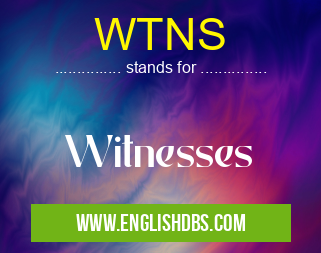What does WTNS mean in LAW & LEGAL
WTNS stands for Witnesses. It is used in the context of government and legal proceedings, especially in court cases. This acronym is used to indicate that a witness has been present at a given event or situation and can therefore provide relevant testimony or evidence about it.

WTNS meaning in Law & Legal in Governmental
WTNS mostly used in an acronym Law & Legal in Category Governmental that means Witnesses
Shorthand: WTNS,
Full Form: Witnesses
For more information of "Witnesses", see the section below.
Meaning
WTNS is an abbreviation that stands for Witnesses. This term is commonly used in government and legal proceedings to refer to individuals who have witnessed a specific event or situation firsthand, and may be called upon to provide testimony or evidence about it at a later date. Witnesses are typically expected to tell the truth under oath when providing testimony in court, meaning they could face criminal charges if they are found to have lied.
Usage
In governmental and legal proceedings, WTNS refers to people who have observed certain events firsthand and may be required to provide testimony as part of those proceedings. In the United States, witnesses may be asked to appear before grand juries when prosecutors are attempting to build their cases against certain individuals or organizations accused of breaking the law. They may also be called upon to testify in civil trials between two parties arguing over damages or other matters related to a dispute. WTNS may also appear in criminal trials as key players in helping prosecutors prove guilt beyond a reasonable doubt, since their testimony presents direct evidence about what happened.
Essential Questions and Answers on Witnesses in "GOVERNMENTAL»LAW"
What is a witness?
A witness is a person who has seen or experienced an event or action and can testify to its validity in court. Witnesses are typically called upon to give evidence in the form of verbal testimony or written documents. Witnesses may also be asked to provide expert opinions on relevant topics.
How do I become a witness?
To become a witness, you will need to contact the court or tribunal which requires you to give evidence and provide your details so that they can arrange for you to attend. You may also need to sign a declaration confirming that the evidence is true and accurate.
What should I do if I am unable to attend as a witness?
If you are unable to attend as a witness, then it is important that you contact the court or tribunal immediately and let them know why you are not able to attend. They may be able to reschedule your appearance or allow for an affidavit of evidence instead.
What responsibilities do witnesses have?
As a witness, it is important that you tell the truth and remain impartial when giving evidence. You should not make any statements which could be interpreted as favouring one side over the other and should always remain courteous when answering questions from legal representatives.
Will I be compensated for my time as a witness?
In most cases, witnesses will be compensated for their time spent in court or attending tribunals. This typically takes the form of reimbursement for any expenses such as travel costs incurred while giving evidence or providing expert opinions, along with an appearance fee for providing testimony in person.
Are there penalties for lying under oath as a witness?
Lying under oath can carry significant criminal penalties such as fines, imprisonment, and disbarment from professional practice depending on the jurisdiction where the dishonesty took place. It is therefore essential that witnesses treat their responsibilities seriously and remain truthful at all times while giving evidence.
Is it possible for witnesses to retract their testimony after giving evidence?
In some cases, witnesses may wish to retract their testimony after giving evidence either due to genuine misunderstanding or because they have been misled into making false statements during questioning by legal representatives. If this occurs, then it is important that the court or tribunal be informed immediately so that steps can be taken averting any possible consequences of perjury.
What happens if my memory fails me while testifying as a witness?
It is perfectly natural for memories of events which have taken place some time ago to fade over time and discrepancies in accounts may be expected due to this effect before, during, and after trial proceedings take place. If your memory fails you while testifying then explain this clearly to the judge who can decide how best deal with lack of clarity in your testimony based on all available facts known at the time
Final Words:
In conclusion, WTNS stands for Witnesses - people who have seen something firsthand and were asked by governmental officials or lawyers representing another party in a dispute to offer their accounts of what happened during court proceedings. By providing second-hand information about an incident or situation, witnesses can help prosecutors form more solid cases against people accused of criminal activity or strengthen one of the parties’ arguments during civil disputes regarding damages or another issue related to the conflict.
